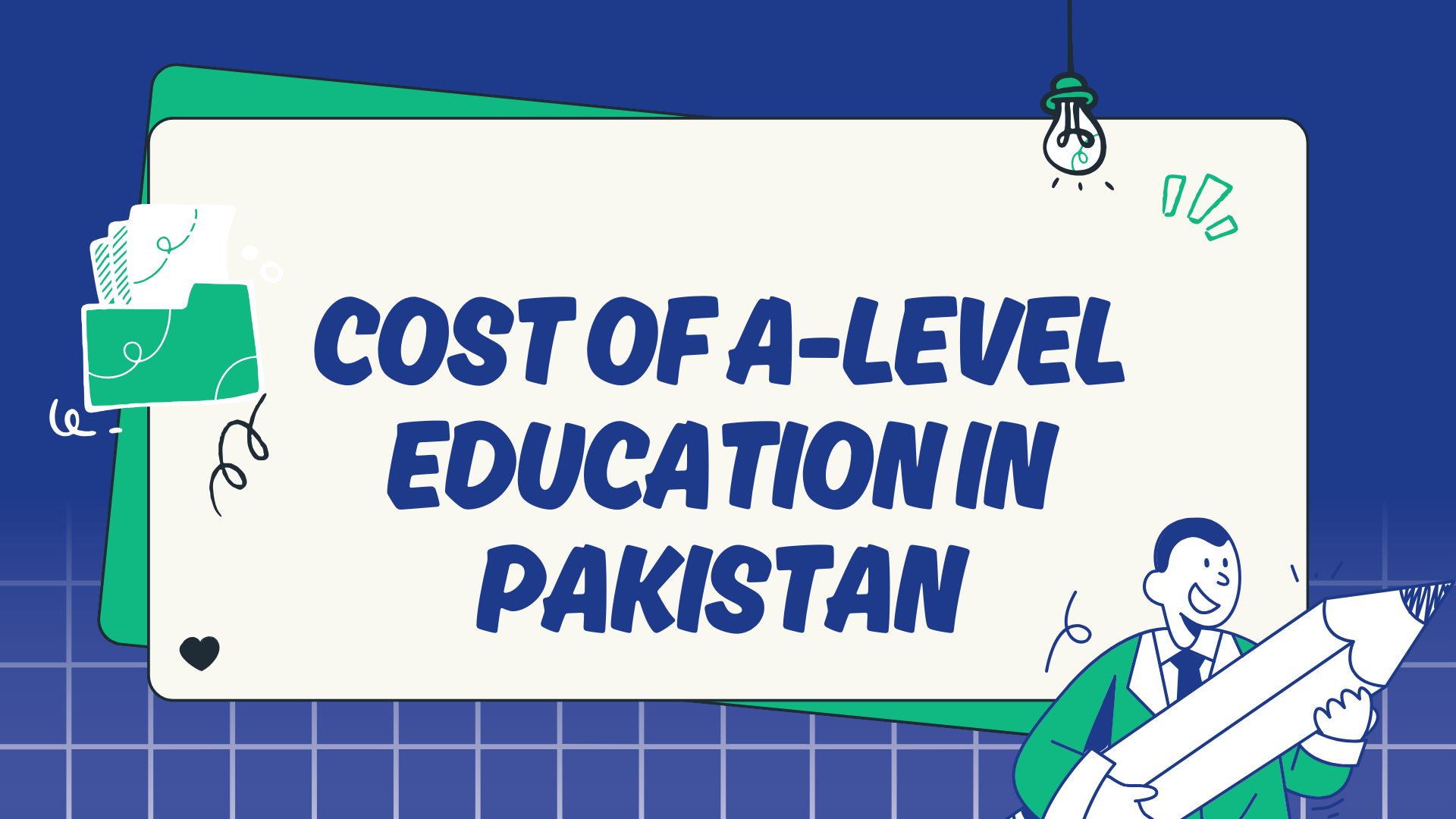A-Level education in Pakistan has become a popular choice among students seeking high-quality education that aligns with international standards. It is known for its challenging curriculum, emphasis on analytical thinking, and ability to prepare students for higher education abroad or in top local universities. The program offers flexibility in subject choice, allowing students to tailor their studies according to their career goals and interests.
However, this premium educational path comes with a considerable financial commitment.The cost of A-Level education in Pakistan varies depending on the school, location, and facilities provided. Expenses can include tuition fees, registration and examination charges, textbooks and study materials, extracurricular activities, laboratory and computer fees, and transportation costs. Families often need to budget carefully to accommodate these costs while ensuring their child receives a holistic education.
Understanding the complete financial picture is crucial for parents and students before enrolling in an A-Level program. This article aims to provide a detailed breakdown of The cost of A-Level education in Pakistan, highlighting the key factors that influence fees and offering insights on how to manage and plan for these expenses effectively.
Understanding A-Level Education in Pakistan

A-Level, short for Advanced Level, is an internationally recognized pre-university qualification offered by examination boards such as Cambridge Assessment International Education (CAIE) and Pearson Edexcel. In Pakistan, A-Level programs are primarily offered by private schools and colleges that follow the British education system, catering to students typically aged 16 to 19 years.
The A-Level curriculum is designed to develop critical thinking, analytical skills, and subject expertise. Students usually select 3 to 5 subjects based on their academic strengths and future career aspirations.
Popular subjects for A-Level Program include Mathematics, Physics, Chemistry, Biology, Economics, Accounting, and Computer Science, among others. Unlike local education systems, A-Level focuses on in-depth understanding, practical application, and independent learning, preparing students for higher education both locally and internationally.
A-Level education is often regarded as a gateway to top universities worldwide. Many students who complete their A-Levels in Pakistan pursue undergraduate studies abroad, particularly in the UK, USA, Canada, and Australia.
In Pakistan, A-Level schools provide modern facilities, experienced faculty, and examination support, but the quality and cost of education can vary significantly depending on the institution and location.
1. Tuition Fees
Tuition fees constitute the largest portion of A-Level education costs in Pakistan. On average, annual fees range from PKR 200,000 to PKR 700,000, depending on the school’s reputation, location, and facilities offered. Key points include:
- Average Annual Fees: PKR 200,000 – PKR 700,000, depending on the school.
- City Influence: Major cities like Karachi, Lahore, and Islamabad tend to have higher fees due to better infrastructure and experienced faculty.
- School Reputation: Prestigious or well-established schools often charge premium fees.
Schools in major cities such as Karachi, Lahore, and Islamabad generally charge higher fees due to advanced infrastructure, experienced faculty, and a wide range of academic and extracurricular resources. Meanwhile, schools in smaller cities or towns may offer more affordable tuition but with comparatively limited facilities.
Parents need to consider not just the fee amount but also the quality of education, teacher expertise, and support services provided when selecting an A-Level school
2. Registration and Examination Fees
Registration and examination fees are an essential part of A-Level education costs in Pakistan. These fees cover enrollment with the examination board and the cost of taking exams each year. Key points include:
- Registration Fees: Students are required to pay a one-time or annual registration fee to enroll with the examination board (Cambridge or Edexcel), usually ranging from PKR 15,000 to PKR 40,000, depending on the board and school.
- Exam Entry Fees: Each subject carries an examination fee, typically PKR 20,000 to PKR 35,000 per subject, which may vary based on the examination board and exam center location.
- Additional Charges: Some schools include extra charges for exam administration, mark sheets, and certificates, which can add PKR 5,000 – 10,000 annually.
- Resit Fees: Students who need to retake exams or resubmit coursework may incur additional fees per subject.
Parents should factor in both registration and examination fees along with tuition when calculating the total annual cost of A-Level education.
3. Books and Study Material
Books and study materials are an important component of A-Level education costs in Pakistan. These resources are essential for understanding the curriculum and preparing for examinations. Key points include:
- Textbooks: Each A-Level subject requires one or more prescribed textbooks, costing approximately PKR 5,000 to PKR 15,000 per subject, depending on the publisher and edition.
- Study Guides & Workbooks: Many students purchase additional study guides, workbooks, or revision materials to aid in exam preparation, costing around PKR 3,000 to PKR 8,000 per subject.
- Practical & Lab Materials: Science subjects such as Physics, Chemistry, and Biology may require lab manuals, experiment kits, or practical workbooks, adding PKR 2,000 – PKR 5,000 per subject.
- Digital Resources: Some schools provide online subscriptions, e-books, or access to educational software, which can cost PKR 2,000 – PKR 10,000 annually.
Parents should budget for all necessary study materials, as having the right resources is crucial for student success in the A-Level program.
4. Cambridge Examination Costs
Cambridge examination fees are a crucial part of A-Level education costs in Pakistan. These fees cover subject registration, exam entries, and any additional charges associated with Cambridge International exams. Key points include:
- Registration Fees: Students must pay a one-time or annual registration fee to enroll with Cambridge International through an approved examination centre. This fee typically ranges from PKR 15,000 to PKR 40,000, depending on the centre and session.
- Exam Entry Fees: Each A-Level subject carries an examination fee, which generally ranges from PKR 17,615 to PKR 43,097 per subject. The exact fee depends on the subject, level (AS or A-Level), and exam centre.
- Additional Charges: Some centres may include fees for exam administration, mark sheets, and certificates, which can add PKR 5,000 – 10,000 annually.
- Late Entry & Resit Fees: Students who register after the deadline or need to retake exams incur additional charges. Late entry fees can range from PKR 10,766 to PKR 26,483 depending on the stage, while retake fees vary per subject.
Parents should consider all Cambridge-related fees along with tuition and other expenses when calculating the total annual cost of A-Level education in Pakistan.
5. Extracurricular & Activity Fees
Extracurricular and activity fees are an additional component of A-Level education costs in Pakistan. These fees cover programs beyond academics that help students develop skills, interests, and social engagement. Key points include:
- Sports & Clubs: Many A-Level schools offer sports teams, clubs, and competitions. Annual fees for these activities typically range from PKR 5,000 to PKR 15,000.
- Arts & Cultural Activities: Programs such as music, drama, debate, and art workshops may have separate charges, usually around PKR 3,000 to PKR 10,000 per year.
- Events & Competitions: Some schools organize inter-school events, exhibitions, and excursions, which can add an extra PKR 2,000 – PKR 8,000 annually.
- Facilities & Resources: Fees may also cover access to sports grounds, gym equipment, and other activity-related resources.
Parents should factor in extracurricular and activity fees along with tuition, books, and examination costs when calculating the total annual expense of A-Level education.
6. Transportation Costs
Transportation costs are an important consideration for A-Level students who rely on school transport services. These fees cover commuting between home and school and can vary depending on distance and service quality. Key points include:
- Monthly Transport Fees: Most schools charge between PKR 5,000 and PKR 15,000 per month for bus or van services, depending on the distance and city.
- Annual Cost: On an annual basis, transportation can amount to PKR 60,000 – PKR 180,000, making it a significant part of overall A-Level education expenses.
- Service Quality: Fees may vary depending on the quality of the transport, including air-conditioned vehicles, GPS tracking, and safety measures.
- Alternative Options: Families living nearby may save costs by using private transport or carpooling with other students.
It should include transportation costs in their overall budget when planning for A-Level education, along with tuition, books, examination, and extracurricular expenses.
7. Uniforms and Stationery
Uniforms and stationery are additional costs that A-Level students in Pakistan need to consider. While smaller compared to tuition or examination fees. Key points include:
- School Uniforms: Most A-Level schools require students to wear a formal uniform. Annual costs typically range from PKR 5,000 to PKR 15,000, depending on the school and quality of the uniform.
- Stationery & Supplies: Students need notebooks, pens, calculators, drawing materials, and other stationery items, which usually cost PKR 2,000 to PKR 7,000 annually.
- Special Equipment: Certain subjects like Science, Art, or Computer Studies may require additional materials or equipment, which can add PKR 1,000 – PKR 5,000 per year.
- Planning Consideration: Parents should budget for uniforms and stationery as part of the total annual cost of A-Level education to ensure students have all the necessary resources.
These expenses contribute to the overall budget. Overall, these study materials form a vital part of the A-Level education cost and contribute significantly to a student’s academic preparation and success.
8. One-Time School Charges for A-Level Students
In addition to annual tuition and recurring fees, many A-Level schools in Pakistan require one-time charges when a student first enrolls. These fees cover administrative and admission-related costs. Key points include:
- Admission Fees: A one-time fee for processing the student’s enrollment, which typically ranges from PKR 20,000 to PKR 50,000, depending on the school’s reputation and facilities.
- Security Deposit: Some schools ask for a refundable security deposit to cover potential damage to school property or resources. This usually ranges from PKR 10,000 to PKR 25,000.
- Orientation or Registration Fees: Certain schools may include additional charges for orientation programs or formal registration, often between PKR 5,000 and PKR 15,000.
These one-time charges are paid at the beginning of the student’s enrollment and should be factored into the total initial cost of pursuing A-Level education in Pakistan.
Estimated Total Cost of A-Level Education in Pakistan

The overall cost of pursuing A-Level education in Pakistan includes tuition, examination fees, study materials, extracurricular activities, transportation, and other miscellaneous expenses. Key points include:
- Tuition Fees: PKR 200,000 – PKR 700,000 annually, depending on the school’s reputation, location, and facilities.
- Registration and Examination Fees: PKR 15,000 – PKR 40,000 for registration plus PKR 17,615 – PKR 43,097 per subject for Cambridge examination entry. Additional charges for late entry or resits may apply.
- Books and Study Material: PKR 5,000 – PKR 15,000 per subject for textbooks and workbooks, PKR 3,000 – PKR 8,000 per subject for study guides and past papers, and PKR 2,000 – PKR 7,000 for stationery.
- Extracurricular & Activity Fees: PKR 5,000 – PKR 15,000 annually for sports, clubs, arts, and cultural activities.
- Transportation Costs: PKR 5,000 – PKR 15,000 per month, totaling PKR 60,000 – PKR 180,000 annually, depending on distance and service quality.
- Uniforms and Additional Supplies: PKR 5,000 – PKR 15,000 annually for school uniforms and PKR 2,000 – PKR 7,000 for stationery or subject-specific materials.
- One-Time School Charges: PKR 20,000 – PKR 50,000 for admission fees, PKR 10,000 – PKR 25,000 for security deposit, and PKR 5,000 – PKR 15,000 for orientation or registration fees.
Overall Estimate: Considering all recurring and one-time costs, the total annual expense of A-Level education in Pakistan typically ranges between PKR 350,000 and PKR 900,000, depending on the school, city, and additional activities chosen.
Parents should plan carefully and budget for both recurring and one-time expenses to ensure a smooth and well-supported A-Level journey for their children.
Factors Affecting the Cost
Several factors influence the total cost of pursuing A-Level education in Pakistan. Understanding these factors can help parents make informed decisions and plan their budget effectively. Key points include:
- School Reputation: Prestigious or internationally recognized schools often charge higher tuition fees due to their academic track record, experienced faculty, and quality of facilities.
- Location: Schools in major cities like Karachi, Lahore, and Islamabad usually have higher fees compared to those in smaller towns or cities, primarily due to better infrastructure and living costs.
- Number of Subjects: The total examination and study material costs increase with the number of subjects a student chooses to study. More subjects mean higher exam entry fees and additional books or resources.
- Facilities and Resources: Schools offering advanced laboratories, libraries, computer facilities, sports complexes, and extracurricular programs may charge additional fees to cover these amenities.
- Transportation Needs: Students requiring school bus services or private transportation will face additional monthly or annual costs, which vary depending on distance and service quality.
- Extracurricular Activities: Participation in sports, arts, clubs, competitions, and school events can add to the total annual cost, depending on the type and number of activities.
- One-Time Charges: Admission fees, security deposits, and registration charges at the time of enrollment can significantly affect the initial investment required for A-Level education.
- Study Materials & Supplies: Costs for textbooks, workbooks, study guides, past papers, stationery, and subject-specific equipment vary depending on the subjects chosen and school policies.
Parents should carefully evaluate these factors to estimate the total cost accurately and choose a school and program that best fits their budget and educational goals.
Tips to Manage A-Level Costs in Pakistan
Managing the cost of A-Level education effectively can help parents provide quality education for their children without unnecessary financial strain. Key points include:
- Compare Schools Carefully: Research multiple schools to compare tuition fees, facilities, and exam preparation support. Choosing a school that balances quality and affordability can reduce costs significantly.
- Plan Subject Choices Wisely: Limiting the number of subjects to what is necessary for university or career goals can lower examination and study material costs.
- Consider Location: Schools in smaller cities or suburbs may offer similar quality education at lower fees compared to top-tier schools in major cities.
- Buy Used or Shared Study Materials: Purchasing second-hand textbooks or sharing resources among students can help reduce expenses on books and workbooks.
- Utilize Online Resources: Many free or low-cost online study guides, past papers, and practice materials are available, which can reduce the need for expensive guides.
- Budget for One-Time Costs: Plan for admission fees, security deposits, and registration charges to avoid financial surprises at the start of the academic year.
- Opt for Efficient Transportation: Carpooling with other students or using nearby transport options can reduce monthly commuting costs.
- Prioritize Extracurricular Activities: Focus on essential or interest-based activities rather than enrolling in all available programs to save on activity fees.
By following these tips, parents can manage the overall cost of A-Level education more effectively while ensuring that students receive a high-quality and well-rounded education.
Conclusion
A-Level education in Pakistan provides students with an internationally recognized qualification, a strong academic foundation, and pathways to top universities worldwide. However, it comes with significant financial considerations that parents need to plan for carefully.
The total cost of A-Level education includes tuition fees, registration and examination charges, study materials, extracurricular activities, uniforms, transportation, and one-time enrollment fees. Depending on the school, city, and additional programs chosen, the annual cost can range from PKR 350,000 to PKR 900,000.
Several factors affect these costs, including the school’s reputation, location, facilities, number of subjects chosen, and participation in extracurricular activities. Parents can manage expenses by comparing schools, planning subject choices strategically, using cost-effective study materials, and budgeting for one-time and recurring charges.
Investing in A-Level education ensures that students not only receive high-quality academic preparation but also gain valuable skills, experiences, and opportunities that will benefit their higher education and career goals. With careful planning and budgeting, families can provide their children with a rewarding and well-rounded A-Level experience in Pakistan.
Frequently Asked Questions (FAQs)
What is the average annual cost of A-Level education in Pakistan?
The overall annual cost of A-Level education in Pakistan generally ranges between PKR 350,000 and PKR 900,000. This estimate includes tuition fees, examination and registration charges, textbooks, stationery, extracurricular activities, uniforms, and transportation. The actual cost depends on the city, the reputation of the school, the number of subjects chosen, and additional services like school transport or special activity programs.
Which cities have the highest A-Level fees?
Major cities such as Karachi, Lahore, and Islamabad tend to have higher fees compared to smaller towns. This is primarily because schools in these cities offer better infrastructure, highly experienced teachers, modern laboratories, libraries, sports facilities, and more extracurricular opportunities. Living costs and higher operational expenses in these cities also contribute to increased fees.
Are examination fees included in tuition?
No, examination fees are usually separate from tuition fees. Students need to pay registration fees ranging from PKR 15,000 to PKR 40,000 and exam entry fees per subject ranging from PKR 17,615 to PKR 43,097 for Cambridge A-Level exams. Additional charges may apply for late entries, resits, or special examination services, so it’s important to budget separately for these costs.
How much do books and study materials cost?
Study materials form an essential part of A-Level preparation. Official textbooks and workbooks generally cost PKR 5,000 – PKR 15,000 per subject, while additional study guides, past papers, and revision books can add PKR 3,000 – PKR 8,000 per subject annually. Stationery items like notebooks, pens, scientific calculators, and lab supplies for practical subjects can cost an additional PKR 2,000 – PKR 7,000 per year.
Are uniforms included in school fees?
Most schools charge separately for uniforms. The annual cost for uniforms typically ranges from PKR 5,000 to PKR 15,000, depending on the school’s policy and the quality of the clothing. Uniform expenses may also include shoes, ties, or sports attire if required. Parents should factor these costs into the total budget to ensure students are properly equipped.
What are one-time school charges?
One-time charges are fees that students pay when enrolling in a new school. These include admission fees (usually PKR 20,000 – PKR 50,000), security deposits (typically PKR 10,000 – PKR 25,000) to cover potential damage to school property, and orientation or registration fees (ranging from PKR 5,000 – PKR 15,000). These costs are in addition to annual fees and should be planned for at the start of the academic year.
Do extracurricular activities cost extra?
Yes, participation in sports, clubs, arts, and cultural activities usually involves additional fees. Annual costs for these activities range from PKR 5,000 to PKR 15,000, depending on the type and number of activities. Some schools may offer packages or discounts for multiple activities, but it’s important to budget for extracurricular programs as they enhance a student’s overall development.
How much is transportation for A-Level students?
Transportation costs vary depending on the distance from home to school and the quality of the transport service. School bus or van services usually cost PKR 5,000 – PKR 15,000 per month, totaling approximately PKR 60,000 – PKR 180,000 per year. Fees can be higher for air-conditioned vehicles, GPS-enabled buses, or routes covering longer distances.
Can costs be reduced by choosing fewer subjects?
Yes, selecting only the necessary subjects for future university or career goals can significantly reduce costs. Fewer subjects mean lower examination fees, fewer textbooks and study materials, and sometimes reduced tuition if the school charges per subject. Careful planning of subject choices can help optimize both financial and academic outcomes.
Are there ways to save on A-Level education costs?
Parents can manage A-Level costs effectively by:
Comparing schools to find a balance between quality and affordability.
Using second-hand textbooks and sharing resources among students.
Utilizing free or low-cost online study guides, past papers, and revision resources.
Limiting participation in extracurricular activities to essential or interest-based programs.
Planning for one-time charges, transportation, and uniforms to avoid unexpected expenses.
By following these strategies, parents can provide a high-quality A-Level education while controlling expenses and ensuring their child receives a well-rounded academic experience.





Leave a comment